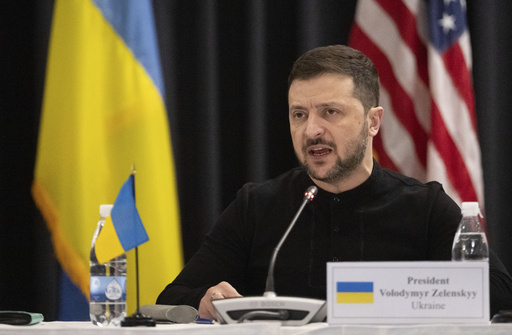
RAMSTEIN AIR BASE, Germany — During their concluding meeting on Thursday, Ukrainian President Volodymyr Zelenskyy and U.S. Defense Secretary Lloyd Austin urged the incoming Trump administration to maintain its support for Ukraine in its ongoing conflict. Austin cautioned that withdrawing military assistance could lead to “more aggression, chaos and war.”
Zelenskyy emphasized the importance of not halting the progress that has been made. “We’ve come such a long way that it would honestly be crazy to drop the ball now and not keep building on the defense coalitions we’ve created,” he stated. He underscored that regardless of global circumstances, nations need to feel assured that their sovereignty will not be compromised.
Concerns have arisen among allies regarding President-elect Donald Trump’s comments about seeking a swift resolution to the war, his favorable stance toward Russian President Vladimir Putin, and ambiguity surrounding his future military aid to Ukraine. The Biden administration has been focused on delivering extensive military support, including a new $500 million weapons package, and relaxing restrictions on missile strikes into Russia to bolster Ukraine’s position ahead of potential peace negotiations.
Austin reinforced Zelenskyy’s message, insisting that “no responsible leader will let Putin have his way.” Despite acknowledging his uncertainty regarding Trump’s actions, he highlighted the consensus among international leaders at the Ramstein Air Base regarding the necessity of sustaining their mission.
The meeting was part of the Ukraine Defense Contact Group, which comprises around 50 partner nations that Austin had assembled following Russia’s invasion of Ukraine in February 2022 to synchronize military aid efforts. During his final press conference as part of the group, Austin expressed, “I’m leaving this contact group not with a farewell but with a challenge. The coalition to support Ukraine must not flinch. It must not falter. And it must not fail.” He emphasized that the survival of Ukraine is critical for global security.
Discussions arose regarding the contingency plans should the U.S. lessen its support for Ukraine. Some participants contemplated how the contact group might evolve under a leading European country, such as Germany. Defense Minister Boris Pistorius noted that Germany and other European nations are exploring various possibilities in this regard.
Austin characterized the continuation of the group as crucial, dubbing it “the arsenal of Ukrainian democracy” and describing it as “the most consequential global coalition in more than 30 years.” A meeting was initially scheduled between President Joe Biden and Zelenskyy in Rome, but Biden canceled due to catastrophic fires in California.
Pistorius mentioned plans to visit the U.S. shortly after Trump’s inauguration on January 20 to engage his counterpart about ongoing military cooperation. Zelenskyy remarked, “It’s clear a new chapter starts for Europe and the entire world just 11 days from now,” emphasizing the need for enhanced collaboration.
Ukraine has launched another offensive in Russia’s Kursk region while facing a volley of long-range missiles and advancing forces from Russia, with both sides aiming to secure a favorable negotiating stance before Trump’s entry into office. Zelenskyy described the Kursk offensive as “one of our biggest wins,” attributing significant troop losses to both Russia and North Korea, which has aided Russia in the conflict. Estimates vary on the casualty figures for North Korean forces, with Zelenskyy claiming about 4,000, while U.S. assessments estimate around 1,200.
Zelenskyy reiterated the ongoing need for air defense systems and munitions to counter Russian missile attacks. The latest U.S. military aid package includes various armaments aimed at bolstering Ukraine’s defense capabilities. Funding for these weapons comes from presidential drawdown authority, allowing for direct withdrawal from U.S. inventories, with efforts underway to deliver them to Ukraine before month’s end.
Should no further aid package be approved, the Biden administration will leave approximately $3.85 billion in funding available for any future military assistance to Ukraine, placing the decision on Trump regarding its allocation. Austin warned the contact group leaders, “If Putin swallows Ukraine, his appetite will only grow.” He stressed that if aggressors are rewarded for their actions, it may result in increased turmoil and warfare globally.
In light of Trump’s electoral success, European nations have been contemplating the implications for their defense against further Russian aggression and the stability of the post-World War II Western alliance. Recently, Trump has made provocative comments regarding Greenland, which is part of Denmark, a NATO-member nation, implying military interventions if deemed necessary. Such remarks could disrupt the foundational norms of the NATO alliance and initiate obligations for member nations to respond to Denmark’s defense needs.
While Austin refrained from commenting on Trump’s statements, Pistorius labeled them as “diplomatically astonishing.” He expressed optimism that such remarks would not severely impact U.S. political dynamics post-inauguration. Globally, nations, particularly the U.S., are ramping up weapons production as the war in Ukraine highlighted deficiencies in preparedness for conventional land conflicts. Since February 2022, the U.S. has supplied approximately $66 billion in total aid, with the majority, between 80% and 90%, already delivered to Ukraine.

